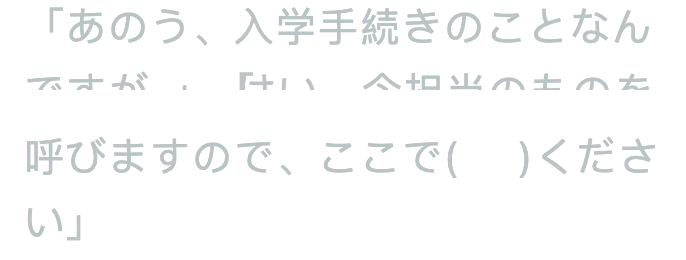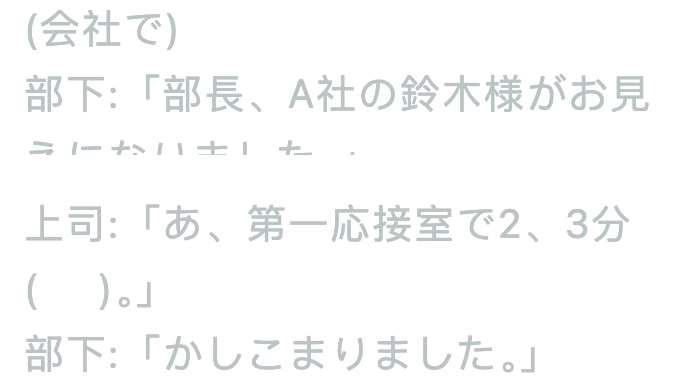11-0011 

11-0011 

- We charge you 10,000 yen for the cost of the item and the packing fee.
- Top Dai-Suru: A self-effacing expression of "もらう".
- Itasu: A self-effacing expression of "する".
12-0025 

12-0025 

- Where can I go for enrollment procedures? I'll call the person in charge now, please wait.
- This question is about honorifics.
- The action of waiting is done by the other party, so use the form of honoring him. "お待ちして」is a self-effacing use of "待たせて: please let me wait," which doesn't fit the meaning of the sentence.
- "お/ご+なさる", "お/ご+なさる".
- お/ご+なさる:Although it also expresses respect, it is seldom used in daily life and the level of respect is not as high as "お/ご+になる". Therefore, choose D.
13-0026 

13-0026 

- Hello, I'd like to receive a copy of this product
- Please pick it up from the person in charge.
- お~ください: a term of respect that indicates that the speaker is asking the other person to do something.
- け取る:to receive, to accept
- Itadaku: A self-effacing phrase for "してもらう". Indicates please allow me ...... Please allow me ...... , does not match the expressed meaning of the article.
- 拝受:"ける "的自谦语。 Since "拝受" already has the self-effacing conjunction "拝", there is no need to add the honorific conjunction "ご" when using it.
- Dedai-suru: A self-effacing expression of "もらう"(もらう).
- Nasaimasu: The honorific for "する".
- Dedai Nasaku Kudasai: No such usage.
14-0027 

14-0027 

- (in company)
- DEPUTY: Minister, Suzuki from Company A has arrived.
- SUPERVISOR: Well, ask him to wait in the first parlor for two or three minutes.
- DEPARTMENT: Okay.
- "お待ちいただく」:It means to ask Suzuki to wait for me as an expression of self-effacement.
- "~てくれ" means that the superior asks the subordinate to do something.
- Can you make me wait?
- disturbance term (math.)
- disturbance term (math.)
15-0028 

15-0028 

- The museum is also open as usual on holidays.
- お/ご+动词连用形/三类动词词干+になれる:It is the possible tense of honorific expression "お/ご+动词连用形/三类动词词干+になる", which means you can ...... You can ...... The meaning of










